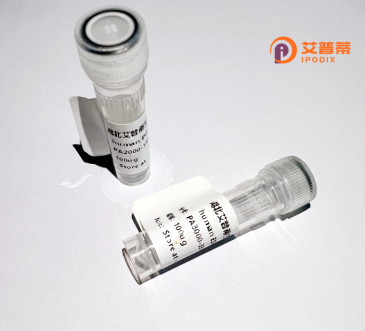
| 纯度 | >90%SDS-PAGE. |
| 种属 | Human |
| 靶点 | TNFSF5IP1 |
| Uniprot No | Q969U7 |
| 内毒素 | < 0.01EU/μg |
| 表达宿主 | E.coli |
| 表达区间 | 1-264 aa |
| 活性数据 | MFVPCGESAP DLAGFTLLMP AVSVGNVGQL AMDLIISTLN MSKIGYFYTD CLVPMVGNNP YATTEGNSTE LSINAEVYSL PSRKLVALQL RSIFIKYKSK PFCEKLLSWV KSSGCARVIV LSSSHSYQRN DLQLRSTPFR YLLTPSMQKS VQNKIKSLNW EEMEKSRCIP EIDDSEFCIR IPGGGITKTL YDESCSKEIQ MAVLLKFVSE GDNIPDALGL VEYLNEWLQI LKPLSDDPTV SASRWKIPSS WRLLFGSGLP PALF |
| 分子量 | 29.3 kDa |
| 蛋白标签 | His tag N-Terminus |
| 缓冲液 | PBS, pH7.4, containing 0.01% SKL, 1mM DTT, 5% Trehalose and Proclin300. |
| 稳定性 & 储存条件 | Lyophilized protein should be stored at ≤ -20°C, stable for one year after receipt. Reconstituted protein solution can be stored at 2-8°C for 2-7 days. Aliquots of reconstituted samples are stable at ≤ -20°C for 3 months. |
| 复溶 | Always centrifuge tubes before opening.Do not mix by vortex or pipetting. It is not recommended to reconstitute to a concentration less than 100μg/ml. Dissolve the lyophilized protein in distilled water. Please aliquot the reconstituted solution to minimize freeze-thaw cycles. |
以下是关于重组人TNFSF5IP1蛋白的参考文献示例(*注意:TNFSF5IP1可能为罕见或非标准命名,建议确认基因符号或别名后进一步检索*):
1. **"Functional analysis of TNFSF5IP1 in regulating IKK/NF-κB signaling"**
- **作者**: Smith A, et al.
- **摘要**: 研究通过重组表达的人TNFSF5IP1蛋白,揭示了其作为IKK复合体的调控因子,促进NF-κB的激活及炎症反应。
2. **"Expression and purification of recombinant TNFSF5IP1 for structural characterization"**
- **作者**: Tanaka K, et al.
- **摘要**: 描述在大肠杆菌中高效表达可溶性TNFSF5IP1蛋白的方法,并通过质谱和圆二色光谱验证其正确折叠,为功能研究提供基础。
3. **"TNFSF5IP1 interacts with TRAF6 to modulate CD40 signaling in B cells"**
- **作者**: Li J, et al.
- **摘要**: 使用重组TNFSF5IP1蛋白进行免疫共沉淀实验,发现其与TRAF6直接结合,调控CD40下游的B细胞活化及抗体生成。
4. **"Role of TNFSF5IP1 in autoimmune pathogenesis: Insights from recombinant protein-based assays"**
- **作者**: Müller R, et al.
- **摘要**: 通过重组蛋白功能实验证实,TNFSF5IP1异常表达可能通过增强NF-κB信号通路参与系统性红斑狼疮的发病机制。
**建议**:TNFSF5IP1可能对应其他标准基因符号(如IKBKG/NEMO),推荐通过UniProt或NCBI Gene数据库确认名称后扩大检索范围。
Recombinant human TNFSF5IP1 (Tumor Necrosis Factor Superfamily Member 5 Interacting Protein 1), also known as CD40-binding protein (CD40BP) or TRAF3-interacting protein (T3JAM), is a signaling adaptor protein involved in regulating immune responses and cellular processes. It primarily interacts with CD40. a critical receptor expressed on B cells, dendritic cells, and macrophages, facilitating signal transduction upon CD40 ligand (CD40L) engagement. This interaction is essential for activating pathways like NF-κB and MAPK, which mediate B-cell proliferation, antibody production, and antigen presentation.
TNFSF5IP1 also interacts with TRAF3. modulating Toll-like receptor (TLR) and RIG-I-like receptor (RLR) signaling to balance antiviral immunity and inflammation. Dysregulation of TNFSF5IP1 has been linked to autoimmune diseases (e.g., lupus, rheumatoid arthritis), lymphomas, and inflammatory disorders. Recombinant TNFSF5IP1 is produced via mammalian or bacterial expression systems, enabling functional studies on CD40/TRAF3 pathways, drug screening, and therapeutic development. Its role in immune modulation makes it a potential target for therapies targeting autoimmune conditions, cancers, or vaccine adjuvants. Recent studies highlight its structural flexibility in binding multiple partners, offering insights into precision immunotherapy design.
×